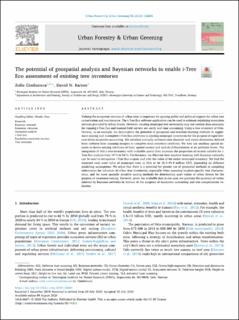The potential of geospatial analysis and Bayesian networks to enable i-Tree Eco assessment of existing tree inventories
Peer reviewed, Journal article
Published version

Åpne
Permanent lenke
https://hdl.handle.net/11250/2677982Utgivelsesdato
2020Metadata
Vis full innførselSamlinger
- Publikasjoner fra CRIStin - NINA [2364]
- Scientific publications [1392]
Originalversjon
10.1016/j.ufug.2020.126801Sammendrag
Valuing the ecosystem services of urban trees is important for gaining public and political support for urban tree conservation and maintenance. The i-Tree Eco software application can be used to estimate regulating ecosystem services provided by urban forests. However, existing municipal tree inventories may not contain data necessary for running i-Tree Eco and manual field surveys are costly and time consuming. Using a tree inventory of Oslo, Norway, as an example, we demonstrate the potential of geospatial and machine learning methods to supplement missing and incomplete i-Tree Eco attributes in existing municipal inventories for the purpose of rapid lowcost urban ecosystem accounting. We correlate manually surveyed stem diameter and crown dimensions derived from airborne laser scanning imagery to complete most structural attributes. We then use auxiliary spatial datasets to derive missing attributes of trees’ spatial context and include differentiation of air pollution levels. The integration of Oslo’s tree inventory with available spatial data increases the proportion of records suitable for iTree Eco analysis from 19 % to 54 %. Furthermore, we illustrate how machine learning with Bayesian networks can be used to extrapolate i-Tree Eco outputs and infer the value of the entire municipal inventory. We find the expected total asset value of municipal trees in Oslo to be 38.5–43.4 million USD, depending on different modelling assumptions. We argue that there is a potential for greater use of geospatial methods in compiling information for valuation of urban tree inventories, especially when assessing location-specific tree characteristics, and for more spatially sensitive scaling methods for determining asset values of urban forests for the purpose of awareness-raising. However, given the available data in our case, we question the accuracy of values inferred by Bayesian networks in relation to the purposes of ecosystem accounting and tree compensation valuation. Bayesian networks Economic valuation Geospatial analysis i-Tree Eco Regulating ecosystem services Tree inventory
